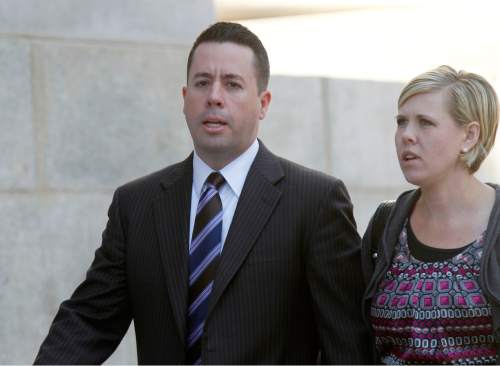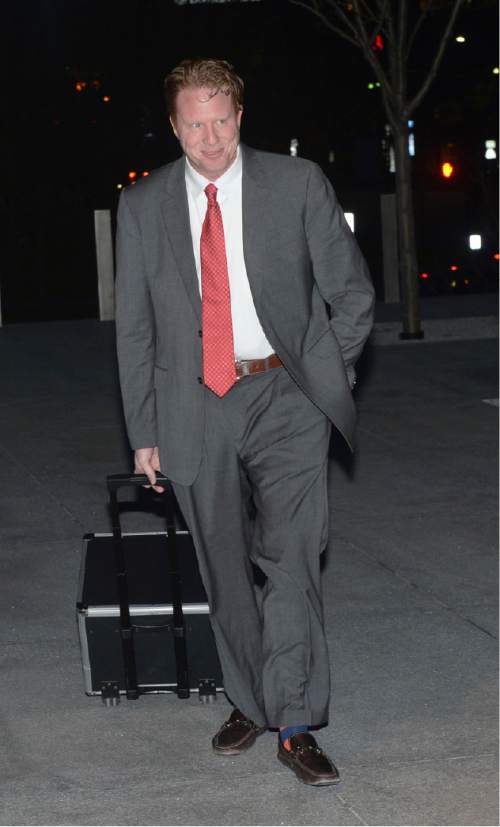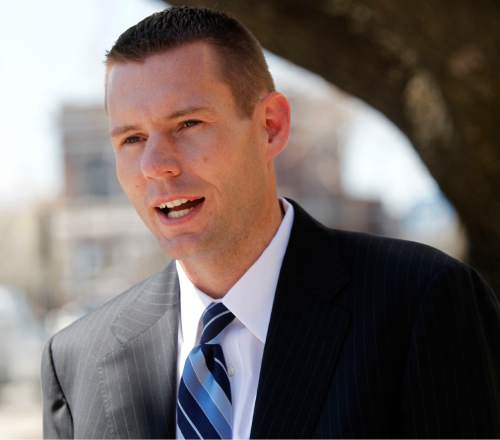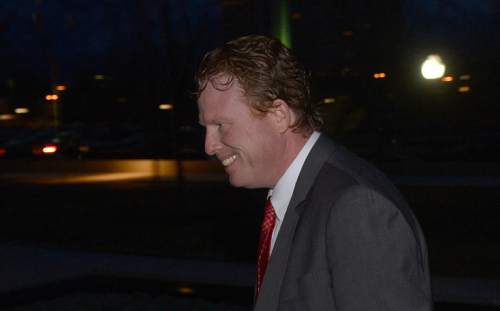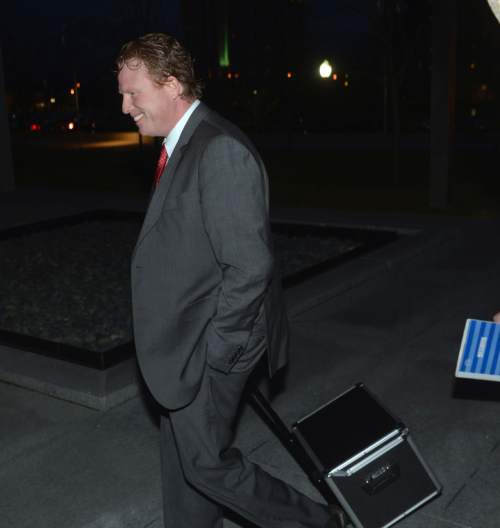This is an archived article that was published on sltrib.com in 2016, and information in the article may be outdated. It is provided only for personal research purposes and may not be reprinted.
St. George businessman Jeremy Johnson broke the bank — or he enriched it.
He created straw companies to fool the bank into opening new accounts because he couldn't use his own name — or his personal guarantee and his company's telephone number on each account showed he wasn't hiding his involvement.
Johnson intended to defraud Wells Fargo Bank — or none of the accounts in question was actually at that bank.
Two starkly different pictures were painted Thursday for a federal court jury that soon will hold in its hands the fates of Johnson and two former top-level employees of his I Works online marketing company.
In the concluding hours of a six-week trial, the 15-member jury — which includes three alternates — began hearing closing arguments about the case that revolves around allegations of bank fraud.
U.S. District Judge David Nuffer said the last arguments by Johnson and the prosecution would be made Friday, after which the jury would get the case.
Johnson, Ryan Riddle and Scott Leavitt are named in the 86-count indictment that includes allegations of bank fraud, submitting false information to a bank, money laundering and conspiracy.
The government alleges that when I Works accounts began to be shut down in early 2009 because of an avalanche of credit-card chargebacks, Johnson and others came up with a scheme to keep the company afloat.
That allegedly involved hiding Johnson's involvement by creating dozens of shell companies using the names and personal information of I Works employees and family members. Those companies then applied for new accounts with which it could continue to charge consumers' credit cards.
Assistant U.S. Attorney Jason Burt pointed to the 281 account applications filled out under the names of those companies.
"Every one of the 281 merchant account applications at issue in this case is a sham, a document full of lies that were designed for the sole purpose of obtaining merchant accounts for I Works and Jeremy Johnson at Wells Fargo Bank," Burt said at the beginning of a presentation filled with exhibits designed to guide the jury to guilty verdicts.
Burt pointed to what he said was the key piece of evidence: an email from former I Works department manager Loyd Johnston to Riddle and Leavitt.
In it, Johnston recounts advice supposedly obtained from agents for credit-card processors about forming the new companies.
"This will only work if the acquiring bank doesn't recognize I Works," wrote Johnston, who had been a defendant in the case before being dismissed after he asserted the government violated an immunity agreement.
"This is the email that proves the entire case," Burt said.
Leavitt's attorney, Marcus Mumford, painted a contrasting picture, one focused on the role of his client but also on the larger question of whether the defendants had intended to defraud Wells Fargo Bank.
Leavitt, an accountant who headed I Works' bookkeeping department, did not participate in any false statements made to banks, Mumford said.
If he was involved in a conspiracy, the attorney asked, why did he write checks to the IRS for Johnson's taxes and not conceal that the money was coming from the accounts of the so-called shell companies?
"He is such a bad conspirator," Mumford said.
The lawyer also said that chargebacks were a huge financial burden for I Works because not only did the company have to refund the money but it also had to pay a fee for each one, in one case $35 per chargeback. That means, Mumford said, the bank actually benefited from chargebacks.
"Not only did the bank not lose a cent, they made money," he said. "Chargebacks made them money."
Mumford also praised Johnson and Riddle for acting as their own attorneys in the case and said they did so "under some of the most adverse conditions I've seen."
The latter apparently referred to restrictions Nuffer put on the defendants before trial involving defenses they could not use, as well as a large number of objections from the prosecution during the trial that the judge sustained.
Mumford also said that evidence called into question whether Wells Fargo actually held these accounts and showed that it had delegated the ability to open new accounts within certain limits to outside credit-card processing or sales companies.
Riddle, toward the beginning of his closing statement, referred to the "Achilles' heel of Mr. Burt," for whom Riddle said the case had become personal.
Nuffer told Riddle to move on after an objection from the prosecution.
Riddle stood in front of jurors and spoke for about 67 minutes in a personal plea for acquittal.
He spent much of his time exploring what he said the evidence showed about the role of Andy Phillips, the owner of CardFlex, the California company that approved all the new I Works accounts.
Phillips had testified that he didn't know that I Works had created all the companies and obtained accounts in the names of employees and family members. Phillips said he was told that I Works was simply providing services for new mom-and-pop companies that wanted to sell products online.
Riddle said, however, that "rogue" affiliate companies for whom I Works provided services caused its chargeback problems and that Phillips had suggested I Works separate the affiliates into different credit-card processing accounts using new corporate entities.
"I was the person who lived it," Riddle said. "I saw it. The evidence I'm referring to right now proves it."
He made several references to his and others' lack of intent to defraud a bank.
"I'm telling you, standing before you as you stand to judge me," he said, "that didn't happen."
Riddle ended his argument with a choked-up plea that the jury find him not guilty.
After the jury had gone home for the day, Nuffer held a discussion over changes the sides were seeking in jury instructions.
At one point, Assistant U.S. Attorney Karin Fojtik said she was worried about a "bait and switch" by the defense.
"I don't know who to trust," she said.
When that drew laughter from the audience made up mostly of family members of the defendants, Fojtik asked the judge to remind the "peanut gallery" not to laugh. Nuffer called a five-minute recess.
Fojtik later apologized and, in response, Nuffer pointed to the stress of the trial. Johnson then proposed blanket forgiveness for both sides and that drew laughter, too.


